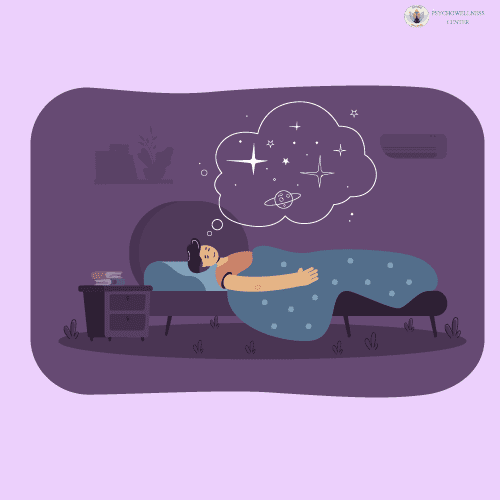Dreaming is a natural part of the sleep cycle, often reflecting our subconscious thoughts and emotions. While most people experience dreams, some individuals suffer from excessive dreaming, which can disrupt sleep quality and impact overall well-being. This article explores the causes of excessive dreaming and offers remedies to manage this condition, supported by insights from research and expert sources.
Understanding Excessive Dreaming
- Defining Excessive Dreaming:– Excessive dreaming, also known as dream recall frequency, involves experiencing an abnormally high number of dreams during sleep. This can lead to frequent awakenings, sleep disturbances, and feelings of fatigue during the day. Individuals with excessive dreaming often recall multiple vivid dreams each night, which can interfere with restorative sleep.
- Normal vs. Excessive Dreaming:– Dreaming typically occurs during the Rapid Eye Movement (REM) stage of Sleep, which cycles several times throughout the night. While occasional vivid dreams are normal, experiencing an overwhelming number of dreams can be problematic. Excessive dreaming may result in prolonged REM sleep or an increased number of REM cycles, leading to disrupted sleep patterns.
Causes of Excessive Dreaming
- Stress and Anxiety:- One of the primary causes of excessive dreaming is Stress and Anxiety. High levels of stress can trigger intense and frequent dreams as the brain processes unresolved emotions and experiences. Anxiety disorders are also linked to heightened dream activity, with individuals often experiencing nightmares or distressing dreams.
- Medications:- Certain medications can contribute to excessive dreaming. Antidepressants, for instance, are known to increase REM sleep and enhance dream recall. Other medications, such as beta-blockers and drugs for Parkinson’s disease, may also affect the sleep cycle and lead to vivid or excessive dreaming.
- Sleep Disorders:- Sleep disorders, including insomnia, sleep apnea, and narcolepsy, can cause excessive dreaming. These conditions often disrupt normal sleep patterns, leading to increased REM sleep or fragmented sleep, which can enhance dream recall and frequency. Addressing underlying sleep disorders is crucial for managing excessive dreaming.
- Substance Use:- Substance ause, particularly alcohol and recreational drugs, can influence dreaming patterns. While alcohol initially suppresses REM sleep, it can lead to rebound REM sleep later in the night, resulting in vivid and excessive dreams. Similarly, withdrawal from certain substances can cause an increase in dream activity as the brain adjusts to the absence of the drug.
Psychological Factors
Psychological factors, such as trauma and unresolved emotional conflicts, can also contribute to excessive dreaming. Traumatic experiences can lead to recurrent nightmares and heightened dream activity as the brain attempts to process and cope with the trauma. Therapy and counseling can help address these underlying psychological issues.
Remedies for Excessive Dreaming
- Stress Management Techniques:- Managing stress and anxiety is essential for reducing excessive dreaming. Stress management techniques, such as mindfulness meditation, deep breathing exercises, and yoga, can help calm the mind and promote better sleep. Regular physical activity is also beneficial for reducing stress and improving sleep quality.
- Medication Review:- Reviewing and adjusting medications with a healthcare provider can help manage excessive dreaming. If certain medications are contributing to increased dream activity, a doctor may recommend alternative treatments or adjust dosages. It is essential to consult a healthcare professional before making any changes to medication regimens.
- Improving Sleep Hygiene:- Improving sleep hygiene can enhance sleep quality and reduce excessive dreaming.Better sleep can be facilitated by establishing a regular sleep pattern, coming up with a soothing nighttime ritual, and making sure the sleeping environment is pleasant. Avoiding stimulants, such as caffeine and electronic devices, before bedtime can also help regulate the sleep cycle.
- Treating Underlying Sleep Disorders:- Addressing and treating underlying sleep disorders is crucial for managing excessive dreaming. Treatments for sleep apnea, such as Continuous Positive Airway Pressure (CPAP) therapy, can improve sleep quality and reduce dream recall. Behavioral therapies and medications for insomnia and narcolepsy can also help regulate sleep patterns and decrease excessive dreaming.
Therapy and Counseling
Therapy and counseling from the Best psychologist in delhi can be effective for addressing psychological factors contributing to excessive dreaming. Cognitive-behavioral therapy (CBT) and other therapeutic approaches can help individuals process unresolved emotions, Trauma, and anxiety. Therapy can also provide coping strategies for managing stress and improving overall mental health.
Conclusion
Excessive dreaming can significantly impact sleep quality leading to lack of sleep or excessive sleep and overall well-being. Understanding the causes, such as stress, medications, sleep disorders, substance use, and psychological factors, is crucial for managing this condition. Implementing stress management techniques, reviewing medications, improving sleep hygiene, treating underlying sleep disorders, and seeking therapy can help reduce excessive dreaming and promote better sleep. These strategies, supported by research and expert recommendations, can enhance sleep quality and overall mental health.
Psychowellness Center provides expert mental health care in Delhi NCR, including Vasant Vihar, Faridabad, and NOIDA. Our aim is to support your journey to wellness.
Contribution: For expert mental health support, reach out to Dr. R.K. Suri, a Clinical Psychologist, and Ms. Siva Tharini, a renowned Counseling Psychologist, available on TalktoAngel.
References
-
American Academy of Sleep Medicine. (2014). International Classification of Sleep Disorders, Third Edition (ICSD-3). Retrieved from https://aasm.org/
-
Brower, K. J., Aldrich, M. S., Robinson, E. A., Zucker, R. A., & Greden, J. F. (2001). Insomnia, Self-Medication, and Relapse to Alcoholism. American Journal of Psychiatry, 158(3), 399-404.
-
Germain, A., & Nielsen, T. A. (2003). Sleep pathophysiology in posttraumatic stress disorder and idiopathic nightmare sufferers. Biological Psychiatry, 54(12), 1092-1098.
-
Levin, R., & Nielsen, T. A. (2007). Disturbed dreaming, posttraumatic stress disorder, and affect distress: A review and neurocognitive model. Psychological Bulletin, 133(3), 482-528.

